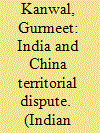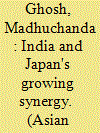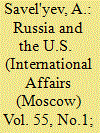| Srl | Item |
| 1 |
ID:
080863


|
|
|
| 2 |
ID:
146585


|
|
|
|
|
| Contents |
China's negotiating strategy on the territorial dispute is to stall resolution of the dispute till it is in
a much stronger position in terms of comprehensive national strength so that it can then dictate
term. The rapidly blossoming strategic partnership between China and Pakistan is also a major cause for concern. During any future conflict with either China or Pakistan - even though the probability is low, India will have to conted with a two- front situation as each is likely to collude military with the other - a situation for which the Indian armed forces are as yet unprepared. Hence, it is in India's interest to strive for the early resolutiion of the territorial dispute with China so that India has only one major military adversary to conted with.
|
|
|
|
|
|
|
|
|
|
|
|
|
|
|
|
| 3 |
ID:
082394


|
|
|
|
|
| Publication |
2008.
|
| Summary/Abstract |
In the post-Cold War era, India and Japan have been moving closer. The possibility of a comprehensive engagement appears quite likely. This article analyzes the new phase of improved Indo-Japanese bilateral relations and explores the variables contributing to this emerging trend. It also examines continuing obstacles to fully cementing "strategic" relations between the two countries
|
|
|
|
|
|
|
|
|
|
|
|
|
|
|
|
| 4 |
ID:
088603


|
|
|
|
|
| Publication |
2009.
|
| Summary/Abstract |
QUESTIONS CONCERNING THE PRINCIPLES of a strategic relationship underlying an international treaty or agreement or a political declaration do not, as a general rule, attract much attention from the expert community. If security and arms control problems are concerned, specific agreements formalized in a particular document take center stage - the level of proposed arms cuts, the time frame, the control and verification system, and so on and so forth. As for principles as such, they are generally regarded as a kind of an addition, an accepted form of such official documents that do not always pertain to serious problems. Furthermore, some international treaties lack any reference to the principles on which they are built (for example, the 1972 SALT I Treaty). Nevertheless, "silence" does not at all mean that the signatories have given insufficient attention to this matter. It is simply that oftentimes it is impossible to harmonize these principles on the official level.
At the same time, it should be noted that the importance of the declared principles has not always been interpreted in the same way in different countries, in particular, the USSR and the U.S. in the course of their long-term strategic relationship. Thus, in drafting the SALT I Treaty (1969 - 72), the U.S. side did not attach sufficient attention to this aspect and never insisted on any one principle being used as the foundation of the agreement in question. By contrast, the Soviet Union put the emphasis on the principle of "undiminished security," demanding that all factors in the strategic balance between the two countries be taken into account in the future agreement. On the practical level, the Soviet side highlighted the need for the future agreement to provide "compensation" to the USSR for the U.S. forward-based weapon systems capable of reaching Soviet territory, as well as for the nuclear arsenals of the U.S.'s NATO allies - Great Britain and France
|
|
|
|
|
|
|
|
|
|
|
|
|
|
|
|